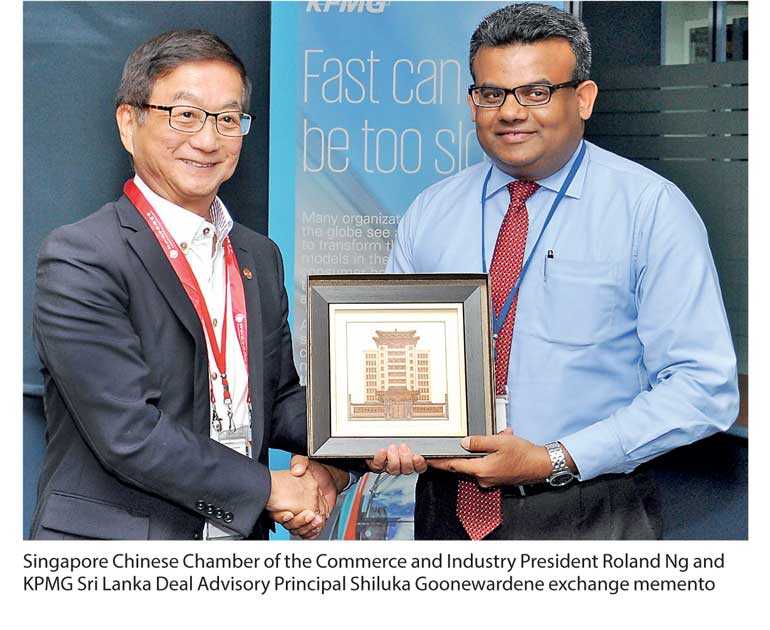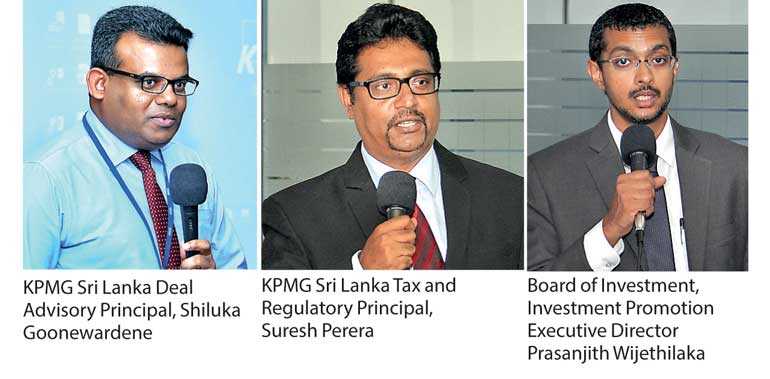Saturday Feb 21, 2026
Saturday Feb 21, 2026
Wednesday, 9 May 2018 00:00 - - {{hitsCtrl.values.hits}}


 By Shannon Jayawardena
By Shannon Jayawardena
Highlighting Sri Lanka’s high potential in foreign investment, KPMG yesterday organised a forum together with the Singapore Chinese Chamber of Commerce and Industry while noting that the country was at a juncture where business was booming.
KPMG Deal Advisory Principal Shiluka Goonewardena said: “What you see in Sri Lanka today is very different from what it was in the past. We have lived through a 30-year civil conflict and now we are a very safe and secure country. Probably a lot safer than most other parts of the world and we are also open for business. We have always been very commercial and we are very much interested in infrastructure. So we are catching up.”
He added that along with that, the pace of doing business has improved and the country has swiftly gone up in the rankings. The current government is very open and positive about Foreign Direct Investment (FDI) and last year Sri Lanka had one of the largest quantum of FDIs.
The country received 2.2% of the total FDI to the South Asian region and 0.7% of the total FDI to lower middle income countries over the five years up to 2016. Sri Lanka has grown to over $ 1.63 billion in 2017, doubling the $ 802 million achieved in the previous year.
KPMG Tax and Regulatory Principal Suresh Perera stated: “We have a very fascinating web of taxes here in Sri Lanka along with other tax treaties and free trade agreements as well. We now have a new Inland Revenue Act and last November the country’s Exchange Control Act was replaced with the Foreign Exchange Act. So the policy of the Government is to make Sri Lanka a trading hub.”
Perera emphasised the fact that there was tariff free access for 80% of the tariff lines in the country, the rules of origin were very much liberalised and there was access to government contracts that are included in the FTA that was signed recently with Singapore.
“On the direct taxes we have an income tax and another tax called the economic service charge which, on the top line is on the turnover. In a way it’s an advanced payment of income tax. Our standard income tax rate is 28%, however there is a lower concession rate for several preferred industries,” he noted.
SMEs, education, tourism, agriculture and exports have a concession rate of 14% while betting, gambling, gaming, liquor and tobacco have a rate of 40% and other areas including banking and insurance have a concession rate of 28%.
Board of Investment Promotion Executive Director Prasanjith Wijethilaka said: “From a socioeconomic perspective, we have some of the key numbers which show that we are ranked 73rd in the Human Development Index which puts us on par with more developed countries and keeps us well ahead of the region. The poverty rate, which is slightly over 4%, has been declining steadily which is something to take note of. The per capita income of close to $ 4,000 indicates that we will be moving towards a middle income country close to 2020.”
He stated that there are seven crucial reasons as to why one should invest in Sri Lanka which are the high literacy rate, quality workforce, infrastructure, location and logistics, reform orientation towards exports and FDI, supportive business environment and the incentive regime that the country has to offer all foreign investors.
Pix by Ruwan Walpola